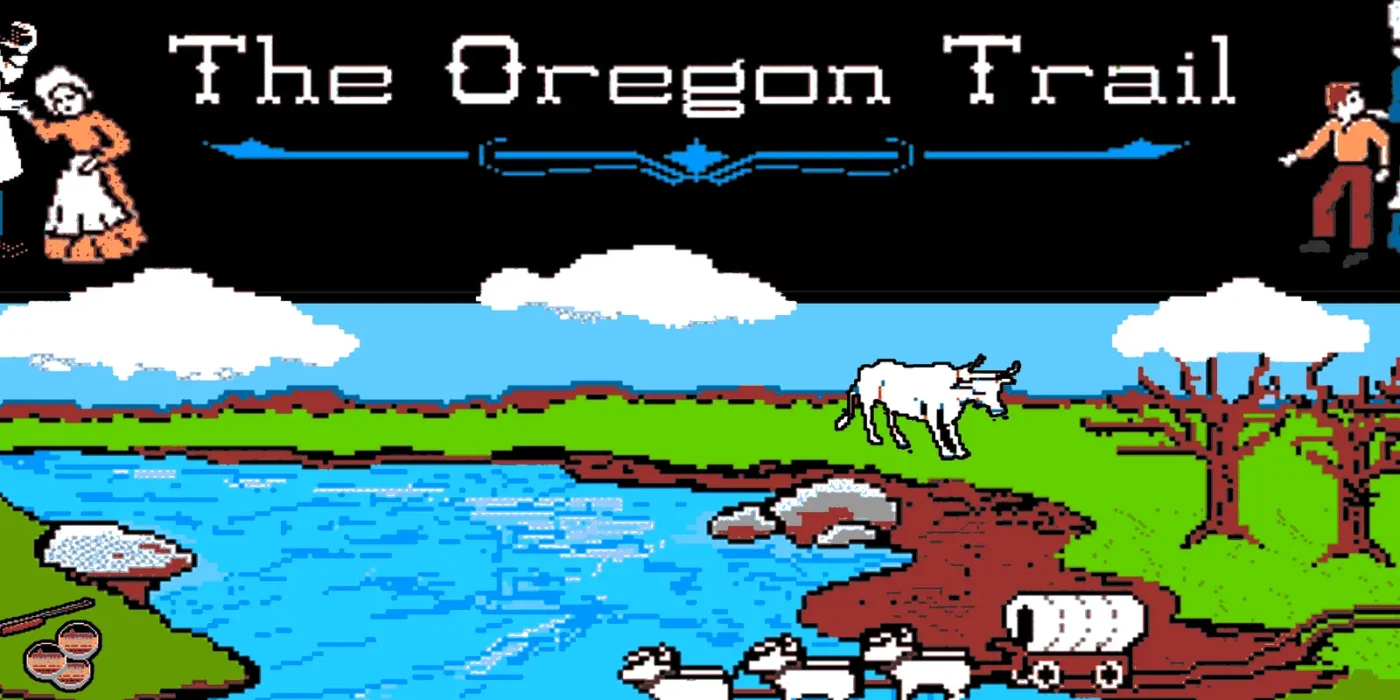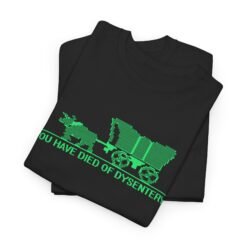Education and History, Funny
The Oregon Trail Game’s Dark Humor: From Pioneers to Dysentery
The Origins of Oregon Trail
The Oregon Trail game, which has become a significant part of both educational technology and American cultural history, was developed in the early 1970s. Initially designed by a group of educators and programmers, this innovative game aimed to teach schoolchildren about the complexities of westward expansion during the 19th century. By simulating the arduous journey that pioneers undertook, the game sought to provide an engaging platform for learning about this pivotal chapter in American history.
Educators at Carleton College in Minnesota recognized that traditional teaching methods often failed to engage students in the rich narrative of westward migration. In response, they created a computer-based game that would not only simulate the challenges faced by emigrants but also foster critical thinking and decision-making skills among players. The game allowed students to assume the role of a wagon leader, navigating the daunting Oregon Trail while confronting obstacles that included limited resources, disease, and harsh weather conditions.
During its development, the creators infused the game with elements that resonated with the cultural context of the era. The 1970s were marked by a burgeoning interest in interactive technology, and this coincidental historical backdrop offered an ideal opportunity to develop educational gaming. The Oregon Trail game was one of the early examples of a serious educational tool that blended gameplay with pedagogic value. As students engaged with the trials and tribulations of pioneering life, such as experiencing dysentery or making critical resource management decisions, they gained a nuanced understanding of the past.
Over the years, the game has evolved and adapted, yet it still retains its original educational focus. The blend of historical simulation and learning continues to captivate new generations, illustrating the lasting legacy of the Oregon Trail and the importance of understanding America’s pioneering spirit.
Dark Humor in a Kid-Friendly Game
The Oregon Trail game is renowned not only for its educational value but also for its unique incorporation of dark humor within a child-centric framework. Set against the backdrop of the 19th-century American frontier, the game juxtaposes the trials faced by pioneers with engaging gameplay that invites both reflection and amusement. By including elements such as illness, accidents, and food shortages, the game evokes a memorable gaming experience that subtly highlights the grim realities of pioneer life.
Through its gameplay mechanics, players navigate various challenges, some of which are quite serious. For instance, characters might succumb to diseases like dysentery or face life-threatening conditions during otherwise mundane activities like fording rivers or hunting for food. This juxtaposition fosters a distinct atmosphere where players can confront the harsh historical context while enjoying a lighthearted approach to survival. Phrases such as “you have died of dysentery” have transcended the game’s initial intent to become cultural icons, illustrating the playfulness that can emerge even in situations that reflect historical tragedy.
The use of such phrases not only adds a layer of humor but also invites players to engage in a dialogue about history in a way that remains accessible to younger audiences. By presenting these harsh realities through a comedic lens, The Oregon Trail creates an environment where children can learn about the past while laughing at the absurdity of certain circumstances. The balance of gravity and levity exemplifies how dark humor can coexist within a kid-friendly narrative, providing players of all ages with an entertaining yet educational experience that explores the complexities of pioneer life.
Cultural Impact and Legacy
The Oregon Trail game, first released in 1971, has indelibly shaped both the realms of education and popular culture. Its unique blend of humor and historical context has allowed it to remain relevant in discussions surrounding gaming and history education. One of the most notable impacts of the game is the prevalence of its memorable phrases, particularly the infamous “You have died of dysentery.” This phrase has transcended into the realm of mainstream vernacular, becoming a shared cultural reference point. It exemplifies the game’s quirky approach to the harsh realities faced by pioneers, highlighting the struggles of survival in a humorous light.
As the years have passed, the influence of the Oregon Trail game has extended far beyond the classroom. Its concepts have been immortalized in various memes and digital media, illustrating a collective nostalgia. The notion of ‘dying of dysentery’ or facing other humorous calamities resonates well with a modern audience, reinforcing the game’s relevance. This phenomenon has been further amplified by social media platforms where users often reference the game in a satirical context, thus propagating its legacy.
Furthermore, the game has inspired numerous sequels and remakes, demonstrating its significant role in the educational software landscape. The evolution of the Oregon Trail – from its early computer versions to contemporary mobile adaptations – showcases the adaptability of the original concept to keep pace with advances in technology and educational theories. This transformative journey not only underscores the game’s enduring popularity but also reaffirms the importance of interactive learning through gaming. In examining the cultural ramifications of the Oregon Trail game, it becomes clear that its legacy will persist, continuing to engage new generations with creativity, humor, and historical insight.
Lessons from the Oregon Trail
The Oregon Trail game serves as a profound illustration of resilience and decision-making, qualities that were paramount for pioneers journeying westward in search of a better life. Players are thrust into a narrative that replicates the challenges faced by these early settlers, providing insight into the hardships and triumphs that characterized their experiences. Through interactive gameplay, individuals learn the importance of making informed choices, as the consequences of each decision can lead to survival or catastrophe. For instance, deciding on the type of supplies to carry, when to rest, or how to cross treacherous terrain directly reflects the critical thinking required throughout the actual trek westward.
Moreover, the game’s incorporation of historical context imbues players with a deeper appreciation for the struggles endured by our ancestors. Players encounter obstacles such as harsh weather, illness, and resource scarcity, each mirroring the very real dangers faced by pioneers. This immersive historical narrative not only informs players about the past but also encourages them to consider parallels in contemporary society. The themes of perseverance amid adversity resonate as individuals confront challenges in their own lives. The game becomes a tool for fostering empathy by humanizing historical figures, reminding players that their decisions, even in a simulated environment, carry weight.
Balancing humor with serious themes is a significant aspect of the Oregon Trail experience. The game employs dark humor in the face of adversity, inviting reflection on the irony and gravity of life and death situations. This juxtaposition allows for engaging discussions about how humor can serve as a coping mechanism in dire circumstances. By integrating such elements, the Oregon Trail not only entertains but also educates, creating a unique platform through which players can engage with the complexity of historical narratives. Ultimately, it teaches valuable lessons about resilience and decision-making that continue to hold relevance today.









